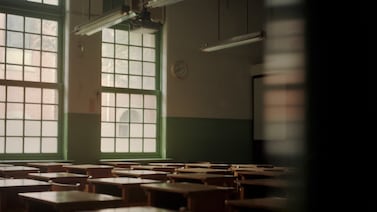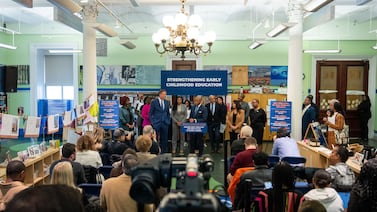Sign up for Chalkbeat Indiana’s free daily newsletter to keep up with Indianapolis Public Schools, Marion County’s township districts, and statewide education news.
Lawmakers on Tuesday advanced a bill that would require certain school districts to share property tax revenue with charters, a potential financial blow to traditional public schools that could force more school closings within Indianapolis Public Schools.
The latest version of Senate Bill 518, passed out of the Tax and Fiscal Policy Committee, would expand property tax revenue for charter schools statewide. It requires all school districts that have at least 100 students living within district boundaries and attending charter schools to share their operations tax revenue with charter schools.
School districts would also have to share a portion of property taxes used to pay off debt for long-term projects — known as the debt service levy — with charters located within their district. The amounts shared would be based on the number of students attending the charter school.
The 10-4 vote along party lines came after a lengthy period of comment from the public, the majority of whom spoke in opposition.
The bill, combined with an amended version of a property tax cap proposal the committee also passed in Senate Bill 1, could deal a significant financial setback to IPS.
At the same time, it would save the state money in funding charter schools. The legislation reduces the amount that charters receive from the state’s Charter and Innovation Network School grant by the amount they would receive in debt service and capital referendum funds shared by public school districts.
In her statement to lawmakers, IPS Superintendent Aleesia Johnson said the bill would guarantee the closure of at least 20 schools and the elimination of hundreds of jobs in the district.
“Additionally, because there are currently no limitations on the number of new charter schools that can be opened in our boundary, the dollars will continue to be more and more splintered until every school gets something, but no school gets enough to actually provide a high-quality service to students through transportation, modernized buildings, or updated infrastructure,” Johnson said.
How SB 518 shifts charter costs from state to school districts
State law already requires school districts in Marion, Lake, St. Joseph, and Vanderbrugh counties to share a portion of the property taxes used for operations with charters located in the same county. SB 518 would extend that requirement statewide.
The bill gradually increases the amount of school district operating and debt service revenues that are subject to sharing, from 33% in 2026, to 66% in 2027, and the full amount in 2028. Gary Community School Corp. would be exempt from tax sharing as a distressed political unit.
The bill would also expand the charter schools’ access to the funds that school districts collect under voter referendums, requiring all school districts to share operating, capital, and school safety referendum revenues with charters.
Charter schools would gain an estimated $16.3 million in 2026 in additional funds from operating and school safety revenues, according to preliminary estimates from the Legislative Services Agency. These schools would receive another $39.3 million in 2027 and $68.8 million in 2028. (These actual amounts could be lower, however, because the bill exempts districts from having to share operations funding needed to pay off debt incurred before May 10, 2025.)
Charter schools would also gain an additional $21.6 million from voter-approved capital referendum ballot questions, according to the estimates.
In their original form, the two bills combined would have cost IPS $40 million in 2026, with the cost growing to about $80 million in 2028, according to IPS officials — but the financial hit to the district under the latest versions of both bills is unclear.
Meanwhile, the state’s general fund is estimated to save at least $21.6 million annually by supplanting existing Charter and Innovation Network School Grant funding from the state with property taxes.
IPS parents and employees who spoke in opposition on Tuesday argued that it would further strip IPS of resources and send money to schools not run by elected boards. They also raised concern over closure rates of Indianapolis charter schools: Roughly one-third of them have closed since the inception of the state’s charter school law in 2001.
“I know that this money would take away from my IPS schools that my children are attending and put them into charters, which essentially are run like private entities,” said parent Grace Dible. “If we believe in the free market so much, why do these private entities need my public tax dollars?”
Charter school leaders and parents in support of the bill argued that funding limitations prevent charter schools from offering transportation or higher teacher pay.
“It’s definitely unfair when you think about the fact that I live in this community where I pay taxes. My neighbors live in the same community and they pay the same taxes, but because their child goes to a traditional public school, therefore their education is valued much higher,” said Sashah Fletcher, a parent active with the Stand for Children Indiana parent advocacy group that’s supportive of charters.
The committee’s four Democrats voted against the bill, while all 10 Republicans voted for it.
Sen. Chris Garten, R-Charlestown, said his support for the bill was based on outcomes. He cited a 2022 study from the Center for Research on Education Outcomes at Stanford University that found that students at Indianapolis charter schools had more days of learning in math and reading than students in IPS.
He also argued that public schools also aren’t held to the same standards as charters.
“If we closed public schools due to the same outcomes that charter schools were held to, public schools would be closing right now,” Garten said.
But Rep. Andrea Hunley, D-Indianapolis, said the bill unnecessarily divides communities.
“We are not operating from a place of scarcity,” she said. “We do not need to pit our community against one another in order to save pennies at the state level.”
Property tax relief could also affect education funding
Lawmakers also amended property tax relief efforts in SB 1. The bill now restricts the amount by which property taxes can grow each year to 0% in 2026, 1% in 2027 and 2% in 2028.
The revised bill should cost government entities just under $300 million in the first year, up to about $800 million in the third year, committee Chair Sen. Travis Holdman told colleagues. That’s less than the loss anticipated under Gov. Mike Braun’s original proposal, which was roughly $1.2 billion in 2026 and up to $1.6 billion by 2028.
The bill also restricts school referendum ballot questions to general election years. School districts also would not be allowed to seek back-to-back referendums to pay for projects financed with bonds, such as buildings.
Both bills advance to the Senate floor for a vote.
Amelia Pak-Harvey covers Indianapolis and Lawrence Township schools for Chalkbeat Indiana. Contact Amelia at apak-harvey@chalkbeat.org.





